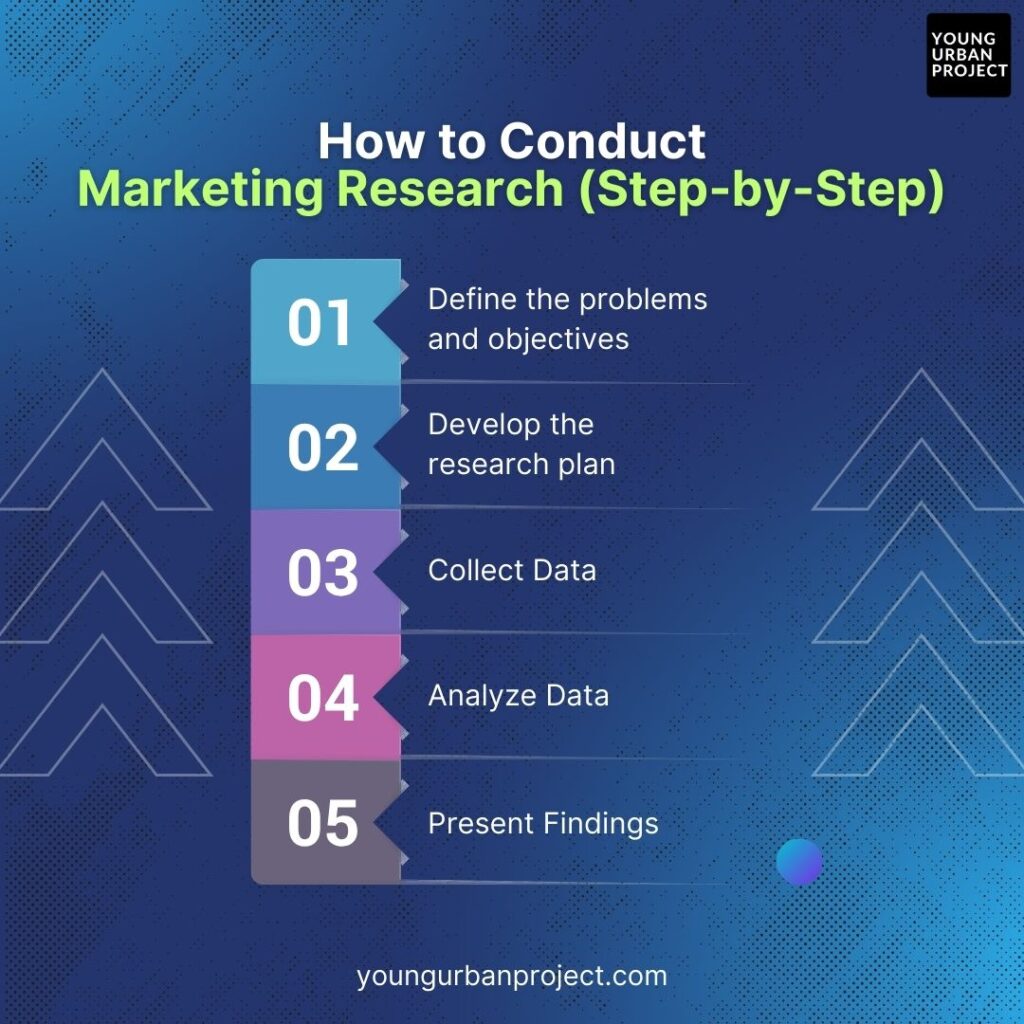Marketing research is an essential component of any successful marketing strategy. Unlike market research, which focuses on gathering data about the market size, competitors, and target audiences, marketing research focuses on understanding the effectiveness of marketing efforts, consumer behaviour, and brand positioning.
In this blog post, we will explore the extensive scope of marketing research, providing valuable takeaways for product marketers, marketing research students, and anyone interested in mastering this critical aspect of marketing.
Table of Contents
What is Marketing Research?
Marketing research involves the systematic collection, analysis, and interpretation of data related to the marketing processes of an organisation. It aims to provide actionable insights that can inform marketing strategies, enhance customer satisfaction, and ultimately drive business growth.
The Difference Between Marketing Research and Market Research
Marketing Research:
It refers to the broader process of gathering and analyzing information to understand how to market a product or service effectively.
The scope of marketing research includes a range of activities including understanding customer needs, evaluating marketing strategies, assessing product performance, and exploring new market opportunities.
Marketing research aims to provide actionable insights to improve marketing efforts, such as optimizing advertising campaigns, designing better promotional strategies, or identifying potential customer segments.
It’s an ongoing process that helps businesses adapt their marketing tactics based on feedback and changing market conditions.
Market Research:
Market Research is a subset of marketing research focused specifically on understanding the market itself. It involves collecting data about market size, market trends, and competitive dynamics.
Market research typically addresses questions about the target audience, including demographics, purchasing behaviors, and preferences.
This research helps companies identify and analyze their target markets, understand market demands, and assess the competitive landscape. It’s crucial for making informed decisions about product development, market entry, and positioning.
Also Read: Objectives of Marketing Research
Importance of Marketing Research
Marketing research plays a vital role in helping businesses make informed decisions. Here’s why:
Data-Driven Decision Making:
Marketing research provides businesses with data that can guide decision-making. For example, a company might use marketing research to determine which advertising channels yield the highest ROI, enabling them to allocate their budget more effectively.
Understanding Consumer Behavior:
By analyzing consumer behavior, marketing research helps businesses understand what drives customer decisions. This understanding can lead to more effective marketing campaigns that resonate with the target audience.
Optimizing Marketing Strategies:
Marketing research allows businesses to evaluate the effectiveness of their marketing strategies. For instance, a company might discover through research that their social media ads are not performing as expected and decide to refine their messaging or target a different audience segment.
Competitive Advantage:
Marketing research helps companies stay ahead of their competitors by analyzing market conditions, competitive strategies, and industry trends. This information enables businesses to identify opportunities, mitigate threats, and differentiate themselves from competitors, ultimately gaining a competitive edge in the market.
Risk Reduction:
Conducting thorough marketing research helps businesses anticipate and address potential challenges before they arise. By understanding market dynamics and customer feedback, companies can reduce the risks associated with new product launches, market expansions, or strategic changes, leading to more successful outcomes.
Also Read: Advantages and Disadvantages of Marketing Research
Scope of Marketing Research
The scope of marketing research is extensive and can be categorized into several key areas.
These areas collectively contribute to a comprehensive understanding of how marketing efforts impact a business.
Product Research
New Product Development: Identifying customer needs and preferences to guide the creation of new products.
Product Improvement: Gathering feedback on existing products to enhance features, design, or functionality.
Concept Testing: Evaluating product ideas or prototypes before launching them in the market.
For example, before launching a new smartphone, a company might conduct product research to determine which features are most important to consumers.
Price Research
Pricing Strategies: Determining the optimal pricing strategy based on consumer demand, competitor pricing, and cost analysis.
Price Sensitivity: Understanding how price changes affect customer behavior and sales volume.
Perceived Value: Assessing how customers perceive the value of a product relative to its price.
Distribution Research
Channel Selection: Identifying the best distribution channels to reach the target market.
Logistics and Supply Chain: Optimizing the supply chain to ensure timely and efficient product delivery.
Retail Research: Understanding customer behavior in retail environments, including store layout, product placement, and in-store promotions.
Sales Research
Sales Forecasting: Predicting future sales based on historical data, market conditions, and other factors.
Sales Channel Performance: Analyzing the effectiveness of different sales channels, such as online, direct sales, or retail.
Sales Territory Management: Optimizing sales territories to maximize coverage and efficiency.
Market Environment Research
Competitor Analysis: Studying competitors’ strengths, weaknesses, strategies, and market positions.
Market Trends: Monitoring trends in the industry to anticipate changes and adapt marketing strategies accordingly.
Regulatory Environment: Assessing the impact of laws and regulations on marketing activities.
Promotion Research
Advertising Effectiveness: Measuring the impact of advertising campaigns on brand awareness, recall, and sales.
Media Research: Selecting the most effective media channels for reaching the target audience.
Message Testing: Analyzing different marketing messages to determine which resonates most with the audience.
Innovation and Trends Research
Emerging Technologies: Identifying and understanding new technologies and innovations that could impact your industry or marketing strategies.
Consumer Trends: Monitoring shifts in consumer preferences, behaviors, and expectations to stay ahead of market changes.
Industry Disruptions: Researching potential disruptions in your industry, such as new entrants or changes in regulations, that could affect your business.
How to Conduct Marketing Research effectively – Step by Step

1. Define the Problem and Objectives
Start by clearly defining the research problem and objectives. What are you trying to learn? For example, if a company wants to understand why a recent marketing campaign underperformed, the research objective might be to analyse customer response to the campaign.
2. Develop the Research Plan
Next, develop a detailed research plan. This includes selecting the research method (e.g., surveys, focus groups), identifying the target audience, and determining the data collection process.
3. Collect Data
Data collection can involve a variety of methods, including online surveys, interviews, and observation. For example, a company might use Data Analytics tools like Google Analytics, Adobe Analytics and more to collect data on website traffic and user behaviour.
4. Analyze Data
Tools like SPSS, PowerBi or Tableau can help in analysing large datasets to identify trends and patterns.
5. Present Findings
The final step is to present the research findings in a clear and actionable way. This might involve creating reports, presentations, or dashboards that summarise the key insights and recommendations.

FAQS about the scope of Marketing Research
Q: What is the scope of marketing research?
A: The scope of marketing research encompasses a wide range of activities, including but not limited to:
- Market Analysis: Identifying and understanding target markets, market segments, and market potential.
- Consumer Behaviour: Studying consumer preferences, purchasing habits, and factors influencing buying decisions.
- Pricing Research: Analysing pricing strategies, price sensitivity, and competitive pricing.
- Promotional Research: Evaluating the effectiveness of advertising, public relations, sales promotions, and digital marketing campaigns.
- Distribution Research: Understanding distribution channels, logistics, and the supply chain’s impact on market reach.
- Brand Research: Measuring brand awareness, brand equity, and brand perception in the market.
- Customer Satisfaction Research: Gauging customer satisfaction and loyalty, and identifying areas for improvement.
Q: Why is marketing research important for businesses?
A: Marketing research is crucial for businesses because it:
- Informs Decision-Making: Provides data-driven insights that help businesses make informed strategic decisions.
- Identifies Opportunities: Helps identify market opportunities, such as emerging trends or unmet customer needs.
- Reduces Risk: Mitigates the risk of launching unsuccessful products or campaigns by providing valuable feedback from the target audience.
- Enhances Customer Understanding: Deepens the understanding of consumer behaviour, preferences, and pain points, enabling more effective marketing strategies.
- Optimizes Marketing Efforts: Helps allocate resources efficiently by identifying the most effective channels, messages, and tactics.
- Improves Product Development: Guides the product development process by revealing customer needs and preferences.
Q: How does marketing research differ from market research?
A: While often used interchangeably, marketing research and market research are distinct:
- Market Research: Focuses specifically on understanding the market itself, including market size, structure, trends, and competition.
- Marketing Research: A broader term that includes market research but also extends to studying other elements of the marketing mix, such as product development, pricing strategies, promotional tactics, and distribution channels.
Q: What are the key methods used in marketing research?
A: Marketing research employs various methods to collect data, including:
- Surveys and Questionnaires: Collecting quantitative data from a large audience to understand trends, preferences, and behaviours.
- Focus Groups: Gathering qualitative insights through guided discussions with a small group of participants.
- Interviews: Conducting in-depth, one-on-one conversations to explore specific issues or topics.
- Observational Research: Observing consumer behaviour in natural settings, such as in-store or online.
- Experiments and Test Markets: Testing hypotheses in controlled environments to gauge the impact of marketing strategies.
- Secondary Data Analysis: Analysing existing data from sources like industry reports, government publications, and academic journals.
Q: What role does technology play in modern marketing research?
A: Technology has transformed marketing research by:
- Enabling Big Data Analysis: Allowing researchers to analyse large volumes of data for deeper insights.
- Facilitating Online Surveys: Making it easier and faster to reach a global audience.
- Supporting Social Media Monitoring: Tracking brand mentions, sentiment, and consumer opinions in real-time.
- Enhancing Data Visualization: Using tools like dashboards and infographics to present research findings clearly and effectively.
- Leveraging AI and Machine Learning: Predicting trends, personalising customer experiences, and automating data analysis.
Hope you have got a much better understanding of the scope of marketing research now.
If you would like to get daily bite-sized content from us, follow us on Instagram!

